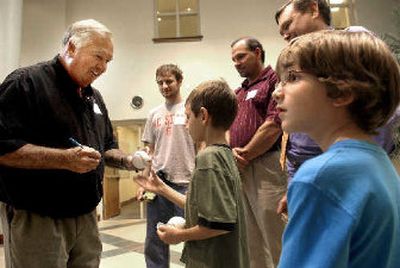Masculinizing church

Is church too much of a girl thing?
That’s the fear of some Christians around the country. They say American congregations need a dose of testosterone. So they’ve launched an effort to make church more of a guy thing.
An Essex County, N.J., congregation recently staged a special football service, with church women playing cheerleaders, the choir and pastor dressed in numbered jerseys and a banner proclaiming, “Christ: He gave his all for the team.”
A Lincoln Park, N.J., church has invited men to occasional paintball competitions – in which players shoot gelatin pellets at each other from air guns.
The pastor of a church in Midland Park, N.J., is trying to inject a more masculine edge into his sermons.
“The language of the modern church is feminine,” the Rev. Scott Nichols says. “It’s unappealing to men.”
Nichols, pastor of Faith Reformed Church, is part of a small but growing movement that wants to lure more men into the pews. Churches, they say, have become too soft. And they have advice for congregations wanting to bulk up.
“Park a Harley (Davidson) in the lobby or, better yet, right next to the pulpit,” author David Murrow advises pastors on his Web site, churchformen.com. “It’s also important to hide the quilted banners, lace doilies and fresh flowers.”
Murrow, who calls himself a conservative evangelical, is the author of “Why Men Hate Going to Church” (Nelson Books, 2004), which compares church to the women’s apparel section of a department store with its “racks of brassieres, blouses, skirts.”
He says women typically account for 61 percent of Sunday morning churchgoers, and that 25 percent of married churchgoing women attend services without their husbands.
“A lot of men are reluctant to go to church because … they are afraid of emasculation,” Murrow writes.
Such thinking troubles some Christians, who say Jesus preached love, redemption and sacrifice – and never engaged in showy displays of manliness.
“Creating a masculinized American church culture is something I don’t see as a biblical mandate,” says Mimi Haddad, president of the Minneapolis-based Christians for Biblical Equality.
“You can’t get away from what the Gospels say – and if you do, you’ve remade Christianity in your own image.”
Others suggest that the movement is fueled by male anxiety about changes in gender roles and values, from women succeeding in the workplace to homosexuals seeking marriage rights to the emergence of “metrosexual” males obsessed with their appearance.
“There is a sense of being unmoored from what used to be stable anchors,” says Evelyn Kirkley, associate professor of theology and religious studies at the University of San Diego. “There is no clear definition of what a real man is anymore, and that’s troubling to some people.”
Indeed, for the churches focusing on men, the model of manhood remains resolutely traditional.
One congregation in the forefront of the movement adorns its worship hall with alpha male symbols, such as golf balls and footballs. The congregation, Grove Community Church of Peoria, Ill., shouts, “We are warriors,” to open services and concludes with a men’s huddle.
The church’s home page, grovechurchonline.com, prominently displays a photograph of a man’s hairy arm.
“When a guy comes in and is not churched, his perception is that it’s a girl thing,” says the Rev. Mark Doebler, who prefers the title “head coach” over pastor. “We want to combat that perception as soon as he walks in the door.”
An East Orange, N.J., church erased any such perception during a recent spirited, football-themed service.
Hundreds of New Hope Baptist Church members came dressed in football jerseys. Cheerleaders rooted “Go saints, go,” and the Rev. Dwight Gill told men to “Get your head in the game!”
Gill says the gender gap in his church on some Sundays can be as great as four women for every man.
“If we look at Christ, he went in the community, and he met people where they were,” he says. “My feeling is that if we can get the men in, then we can get the (Gospel) message out.
“And when I get a man,” he adds, “I don’t get just one man, I get families.”
The Rev. Ron Rombough, pastor of small groups at Jacksonville Chapel in Lincoln Park, says his church tries a range of approaches, from paintball outings – which appeal to the “warrior” spirit – to pancake breakfasts.
But he stresses that every event has a higher purpose: presenting the Gospels and forming disciples.
At the Midland Park church, Nichols has formed a softball team and Bible study group for men. He encourages Sunday morning banter about NASCAR, fishing and other distinctly male pursuits.
Such efforts, scholars say, are in keeping with a long Christian tradition of using the prevailing culture to reach people with the Gospel.
But there’s also a risk.
“The danger is when the medium becomes the message and Christianity loses its critical edge,” says the University of San Diego’s Kirkley. “It’s that whole tension of being in the world but not of the world.”